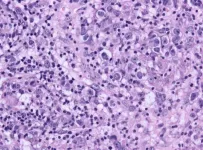(Press-News.org) (WASHINGTON, Nov. 8, 2023) – Using birth control pills and other hormone-based contraceptives is known to elevate the risk of blood clots about three-fold, but a new study suggests that this risk largely goes away within two to four weeks after one stops using these contraceptives, according to research published today in Blood.
The findings – the first to provide such confirmatory guidance on the best timing to stop contraception – can help patients and doctors weigh the benefits and risks of hormonal contraceptives and guide when to stop using them ahead of events that could further increase the risk of dangerous clots, such as major surgery, prolonged periods of immobility, or when tapering anticoagulant medications after a blood clot (deep vein thrombosis or pulmonary embolism). Based on the findings, researchers say stopping contraceptives two to four weeks ahead of time should be sufficient in most cases.
Combined hormonal contraceptives have long been known to increase the risk of blood clots, affecting roughly 10 in 10,000 individuals on estrogen-containing birth control, according to the Centers for Disease Control and Prevention. What has been less clear is how long this effect lingers once a person stops using contraceptives. Several medical guidelines recommend stopping hormonal contraceptives ahead of certain medical events, such as major surgery, but most do not specify how long someone should be off birth control beforehand.
“Our goal was not to look at the thrombotic risk of contraceptives, but to determine how long that risk takes to normalize after stopping contraceptives,” Marc Blondon, MD, an expert in vascular medicine at the University Hospitals of Geneva, Switzerland, and the study’s corresponding author. “It’s reassuring to know that that possible harm of the pill goes away rapidly when one stops taking it.”
The study focused on birth control methods known as combined hormonal contraceptives, which include birth control pills, vaginal rings, and transcutaneous patches. These methods prevent pregnancy by releasing estrogen and progestin to stop ovulation and are the most common contraceptives in Europe and North America.
For the study, researchers collected blood samples from 66 women on hormone-based birth control at six timepoints before and after the women stopped using their contraceptives. Participants voluntarily stopped using hormonal contraceptives for personal reasons. Dr. Blondon and team then compared the samples with blood from a control group of 28 women who were not using hormone-based birth control.
The researchers measured several biomarkers that are associated with combined hormonal contraceptives and clotting activity. These include global markers of coagulation activation due to hormones and individual coagulation factors (factor VIII and factors that inhibit clotting)
As expected, participants showed elevated levels of clotting markers before they stopped using their contraceptives. However, these coagulation markers dropped precipitously within one to two weeks after they stopped taking birth control, and by week 12, all markers were similar to the control group.
Overall, around 80% of the total drop in clotting markers seen in these women occurred within two weeks of stopping their birth control and 85% of the drop occurred within four weeks. This suggests that the likelihood of developing clots due to birth control returns to nearly normal levels within the first few weeks of stopping birth control.
“These findings can help to inform discussions around whether combined hormonal contraceptives are right for the patient, as well as patient-surgeon discussion of whether the benefit of stopping for a short time actually exceeds the risks,” said Dr. Blondon. “It’s very important to talk about the benefits of contraception because it’s crucialto avoid unwanted pregnancy and for women to have the choice of a planned pregnancy.”
He adds that in addition to reducing the risks of unwanted or unplanned pregnancies, combined hormonal contraceptives have been found to ease pelvic pain disorders, decrease the risk of anemia, and lower the risk of developing endometrial and ovarian cancers. Stopping hormonal contraceptives early when a VTE occurs may also lead to abnormal uterine bleeding, a risk that Dr. Blondon explains leads many doctors to advise patients to continue using hormonal birth control for a period while they are taking anticoagulants to treat the VTE.
Researchers noted that the study was conducted in Switzerland and that most participants were young, Caucasian, and of healthy weight. Subgroup analyses did not show any indication that the results would be different in older women, different racial groups, or people who are overweight, though a larger study would be needed to increase confidence in the generalizability of the results across groups. In addition, Dr. Blondon explained that the study used biomarkers as a proxy for clotting risk; additional studies are needed to confirm whether this translates to a reduction in the risk of actual clotting events.
# # #
Blood (www.bloodjournal.org), the most cited peer-reviewed publication in the field of hematology, is available weekly in print and online. Blood is a journal of the American Society of Hematology (ASH) (www.hematology.org).
Contact:
Kira Sampson, American Society of Hematology
ksampson@hematology.org; 202-499-1796
END
A new study published in Nutrients shows daily consumption of strawberries for 12 weeks reduced interference in memory and depressive symptoms among middle-aged, overweight adults with self-reported mild cognitive decline.
“Dementia is a general term that includes many different diseases, all without remedies,” says Robert Krikorian, Ph.D., principal investigator and professor in the department of psychiatry at the University of Cincinnati Academic Health Center. “It is not clear when ...
Silicon (Si) is abundant in terrestrial environments and accounts for 0.1% to 10% of a plant’s dry weight. Certain plant species show high levels of Si accumulation, and research has identified high Si accumulation as a protective mechanism against abiotic (drought, cold, heat) and biotic stressors (living organisms). Oryza sativa (rice) can store Si to the tune of 10% of the dry weight of shoots (stem, leaves, flowers), and Si is vital for stable grain production. High degree of Si deposition is believed to mitigate against damage caused ...
The American Pediatric Society (APS) is pleased to announce Glenn Flores, MD, as the 2024 David G. Nichols Health Equity Award recipient.
The David G. Nichols Health Equity Award, administered by the APS and endowed by the American Board of Pediatrics (ABP) Foundation, was created to recognize demonstrated excellence in advancing child and adolescent health, well-being, and equity through quality improvement, advocacy, practice, or research. This award recognizes Dr. Flores’ outstanding contributions to advancing child and adolescent health, well-being, and equity and the ...
Under the ocean’s surface, marine organisms are constantly releasing invisible molecules. Some of the chemical clues reveal which creatures are nearby, while others could be used someday as medications. Now, researchers in ACS Central Science report a proof-of-concept device that “sniffs” seawater, trapping dissolved compounds for analyses. The team showed that the system could easily concentrate molecules that are present in underwater caves and holds promise for drug discovery in fragile ecosystems, including coral reefs.
A ...
By rapidly reversing the effects of an opioid overdose, naloxone saves lives ― if it’s available at the right time. To eliminate this element of chance, researchers are exploring ways to have the medication available in the body before it’s needed. In a proof-of-concept in ACS’ Nano Letters, a team has designed injectable nanoparticles that released naloxone when triggered by blue light. In experiments with mice, this system was activated a month after injection.
Since it began more than two decades ago, the opioid epidemic has taken an enormous toll on people’s lives. In 2022 ...
In patients with systemic sclerosis (SSc), a rare connective tissue disease, interstitial lung disease contributes to 35 percent of deaths. Published recently in the American Journal of Respiratory and Critical Care Medicine, the latest American Thoracic Society Clinical Practice Guideline makes a number of recommendations. One recommendation expands antifibrotic treatment to all patients with systemic sclerosis associated with ILD (SSc-ILD), not just those with progressive disease.
Watch the explainer video.
Lead guidelines chair and editor, Ganesh Raghu, M.D., ATSF, noted the timeliness of the recommendations given the many immune ...
Central diabetes insipidus (CDI), a rare condition involving the destruction or degeneration of neurons of the hypothalamic-posterior pituitary in the brain, has several likely underlying clinical causes. Patients with CDI experience excessive thirst and excessive urine production, owing to the decreased secretion of AVP. Moreover, in children and young adults with CDI, a malignant tumor known as a 'germinoma' may develop later in life. The diagnosis of these tumors is challenging, because biopsy in intracranial lesions is difficult.
Lymphocytic infundibulo-neurohypophysitis (LINH) or ...
General anesthesia evokes a dual mystery: How does it disrupt consciousness, including sensory perception, and what might that say about the nature of consciousness. A new study led by researchers at The Picower Institute for Learning and Memory at MIT provides evidence in animals that consciousness depends on properly synchronized communication across the brain’s cortex and that the anesthetic drug propofol cancels sensory processing by cutting it off.
In the Journal of Cognitive Neuroscience, researchers report clear evidence that in anesthetized animals, ...
Genetic information collected from seemingly healthy tissue near lung tumors may be a better predictor of whether cancer will come back after treatment than analysis of the tumors themselves, according to new research led by NYU Langone Health and its Perlmutter Cancer Center.
The new study focuses on lung adenocarcinoma, a cancer that forms in alveolar epithelial cells and accounts for about a third of all lung cancers in the United States, according to the U.S. Centers for Disease Control and Prevention. Most patients are cured if tumors are surgically removed early in the disease’s progression, but residual ...
UCLA scientists have developed a new method to engineer more powerful immune cells that can potentially be used for “off-the-shelf” cell therapy to treat challenging cancers.
“Off-the-shelf” cell therapy, also known as allogenic therapy, uses immune cells derived from healthy donors instead of patients. The approach can bring cell therapies, like chimeric antigen receptor (CAR) T cell therapy, to more patients in a timelier manner, which is one of the major barriers in getting these life-saving treatments to patients.
“Time is often of the essence when it comes to treating people with advanced cancers,” said Lili Yang, associate professor ...




